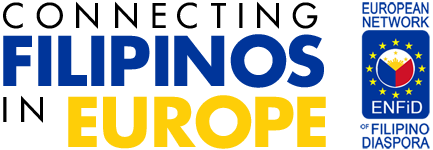The Biogas Digester Project: A glimpse of hope in renewable energy source for homes
By Ruby Anna Bengtsson, member Environment Team ENFiD
Imagine a home, even in far-flung villages in the Philippines, that would not need to depend on electricity to cook its meals, and at the same time could be able to recycle biodegradable waste products into usable fuel. That is exactly the thought of ENFID, when it kick-started a project in early 2016 that will hopefully not only introduce to our kababayans back home the awareness of renewable energy for a sustainable environment, but also to augment the financial aspects of low-income households.
The Biogas Digester Project idea came about during the Board meeting in Bonn in November 2015, when a decision was made for ENFiD to embark on a project which will help preserve the environment and raise the consciousness of Euro-Pinoys and kababayans in the Philippines about ecological concerns. This was followed by a visit of some board members to a company specializing in renewable energy in the Netherlands. The machineries were grand in scale and expensive, so even if the ENFiD Secretariat was discussing a possible cooperative project with Atikha – a migrant service and support organization based in the Philippines, and Pinoy Wise Qatar, the idea was shelved for sometime. Until early this year when ENFiD’s Executive Director researched on the a more viable, small-scale biogas digester. She discussed the idea with Diana Halmans, the Country Representative ENFiD Netherlands, who happened to be in good contact with Cernan Faicol, an Ilo-ilo based engineer. It was then that the ball started rolling- the researched information was sent to Cernan and he made the working model. This was presented at the ENFiD General Assembly in Prague and received an overwhelming support.
What is a biogas digester? In brief, a biogas is a clean and renewable fuel, similar to a LPG (Liquified Petroleum Gas), which you can make yourself. This biogas can be made in a digester, a container, usually a large tank where organic wastes are put in and in time naturally decompose with the help of bacteria and as a result will give off a flammable gas. Biological wastes derived from trimmings of flowers, vegetables, fruits, food rest, many kitchen and garden wastes are good example.
The Project in Overview. This project will show a concrete illustration of how sustainable energy in a very doable way can be used. Simultaneously, it can educate the people involved in the development projects we support which would make it easier to work and understand one another in the common goal of protecting the environment. This project hopes to also create a snowball effect when it comes to implementing it in the community. First, in the individual household and then to a greater scale in schools, business establishments, and eventually to industries like transportation and manufacturing. This project can show that there are alternative sources of energy other than fossil fuel, which comprise the biggest energy source in the present, albeit harmful to the environment. The future holds many possibilities for renewable energy.
The rationale on why ENFID chose this project can be seen on the common reason of many, if not all, that each and everyone has the responsibility of taking care of our environment. Being the medium of spreading knowledge on renewable energy source and its implementation to be used simply at homes is a major goal for the project. Also, the project aims that it has to be financially sustainable as well. Therefore, the ENFID Environment Team has taken the initiative to contact engineers in the Philippines who can make the first working model. A financial study of the project is also taken into equal importance.
The project implementation will include collaboration of ENFID Environment Team with other renewable energy companies, Philippine-based engineers, site project and stakeholders, interested ENFID members, and other relevant ENFID officers.
The future in renewable energy. The potential of making use of our natural world in creating energy sources without compromising the natural resources of the future generation has always been a top debate topic in many countries. The economics, environmental, and social impact of this topic have been studied and discussed several times in Europe, as well as in relation with the many third-world countries where, mostly, many of these natural resources come from. The quest for renewable energy source is here to stay, as the world’s population and consumption continue to grow. The importance of sustainable development will only increase by time, some times slower than others, but it steadily and surely going to be the future. The question remains – how can we, as individual or group, be involved with it in our own way and see it first-hand when it happens in the near future.
On its part, ENFiD is contributing by developing this biogas project into a social enterprise where the Euro-Pinoys can socially and financially invest together. This way not only are they helping the local communities in the Philippines to an alternative, cheap fuel source, they are also helping create jobs locally and their invested money will also earn a little.
We hope for a time when a family, in a village somewhere in the Philippines (and even families in the city, too), can say that they are a part of this future.

